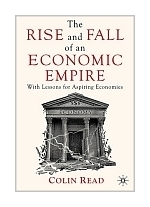net price + 5% vat.
While many authors have documented empires maintained through military strength, power
derived solely from economic might is a more modern phenomenon. These different sources of
power share one important characteristic, though. There is an inevitability to the decline
of empires that rest on either foundation. There are also lessons to learn from every
empire.
Just as earlier empires based on military or colonial power experienced spectacular
ascendancies and subsequent declines, modern economic empires are no less fragile. The
overextension, overconfidence, and underinvestment that lead to the demise of military or
colonial empires have their analogies in economic empires. An economic superpower grows
based on its strengths, is fueled by its successes, but declines as its values are
transformed and economic arrogance dilutes its hegemonic powers.
Colin Read describes the various factors that give rise to economic empires, and
documents how these same forces eventually lead to their downfall. By analyzing the
successes of each factor and the reasons why each falters, he offers insights into ways to
sustain economic relevancy. He also offers lessons to aspiring economies so that they may
best leverage and manage their growth and avoid the problems that beset less carefully
designed economies.
In doing so, Read gives us an interesting and provocative glimpse into the current global
dynamic in which the United States, the world's first true economic empire, struggles to
maintain its global economic supremacy in the face of a rapidly growing China that shall
soon challenge it as the world's largest economy.
COLIN READ is a columnist and the author of a number of books for
the academic and popular press on economic issues. He is a Professor of Economics and
Finance at the State University of New York, USA. He has worked in Indonesia for the
Harvard Institute for International Development, and at the Harvard-MIT Joint Center for
Housing Studies. This is his fourth English language book. His previous titles include:
Global Financial Meltdown – How We Can Avoid the Next Economic Crisis; The Fear Factor
– What Happens When Fear Grips Wall Street and co-edited and co-authored The
International Taxation Handbook.
Contents
Introduction
PART I: FROM 10,000 B.C. TO 1776 – THE DISCOVERY OF ECONOMIES OF SCALE
An Economic Prehistory to Economic Emperors
Barter, Economic Emperors, and the Decentralized Marketplace
Specialization and Surpluses
The First Industrial Revolution
Colonialism Puts Sugar in Our Tea
PART II: A SECOND INDUSTRIAL REVOLUTION
A Declaration of Economic Independence
An Economic Bill of Rights
Dominance Through Economics
Private Solutions to Public Problems
PART III: THE NEW MERCANTILISTS
The Consumer as King
A New Colonialism
Dependency Economics
PART IV: ASPIRING NATIONS
Transfer of Technology
Economic Imitation is the Sincerest Form of Flattery
Heckscher, Ohlin, and Two Billion
Hungry and Willing to Work for Change
PART V: GROWING PAINS
Complex Economic Systems
Herding Cats and Chaos Theory
Too Big to Fail
Private Property Gives Way to the Public Good
The Winner's Curse
PART VI: A NEW ECONOMIC ORDER
The Politics of a Consumption Economy
Gradual economic Marginalization
A New Economic Order
Convergence
PART VII: FROM WHERE HAVE WE COME, AND WHERE WILL WE GO?
The Dance of Demographics
Steady State and Sustainability
Economic Darwinism and Dinosaurs
Prescriptions for Relevance
Conclusions
312 pages, Hardcover


